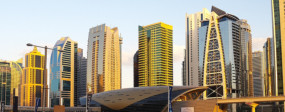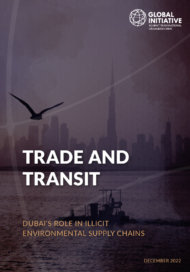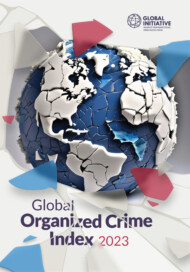Posted on 26 Jun 2024
As the UAE assumes a leadership role in the international response to crime, it remains to be seen whether it is committed to fighting crime or simply ‘crimewashing’ its public image.
On 18 May 2024, Albania’s Struktura e Posaçme Kundër Korrupsionit dhe Krimit të Organizuar (the country’s judicial body responsible for investigating corruption and organized crime) conducted a major operation against seven criminal groups active in the country and in the EU. The operation, supported by Europol, was based on information from the intercepted Sky ECC communications application. Arrest warrants were issued for 50 suspects, but only 20 were detained. Media reports indicated that some of the main targets of the operation had fled to the United Arab Emirates (UAE) to evade arrest.
The UAE, and Dubai in particular, has long been a haven for criminals from the Western Balkans. Before the May operation, some 25 Albanian nationals wanted by the country’s justice system were known to reside in the UAE, according to a senior Albanian police officer. An even larger number of Albanians believed to be involved in criminal activities, but not yet wanted by the authorities, are also reported to be in the country to avoid extradition if arrest warrants are issued.
But the UAE is not just a destination for Albanian criminals. For years, it has served as a haven for some of the world’s most wanted criminals and corrupt individuals, allowing them not only to evade justice but also to launder their illicit proceeds. According to the 2023 Organized Crime Index, the UAE has emerged as a significant global centre for financial crimes and money laundering, with a score of 9.5 out of 10 for financial crimes – the highest in the world, tied with Libya. With encrypted platforms such as Sky ECC and EncroChat now intercepted by European law enforcement, many have sought the alternative protection afforded by the UAE.
Despite the shady characters it attracts, the UAE has a zero-tolerance policy towards illegal drug use, with drug trafficking considered a serious crime. Carrying weapons and public displays of violence are also heavily penalized. Consequently, the international criminals and law offenders believed to be in the UAE generally refrain from engaging in these types of activities while in their host country. ‘Only in Dubai do the leaders of two rival gangs find themselves dining in the same restaurant, yet neither dares to lift a finger against the other,’ an Albanian journalist told the Global Initiative Against Transnational Organized Crime.
Due to the high number of their nationals fleeing to the UAE, many countries have sought extradition agreements with the Gulf country to prosecute suspected criminals in their home countries. For example, at the end of April, Albania’s interior minister made an official visit to Dubai to seek agreements on extradition, mutual legal assistance and the transfer of sentenced persons.
However, as the examples below show, signing and adopting extradition treaties with the UAE does not necessarily ensure that extraditions will take place. There are various reasons why countries struggle to obtain results, but most experts believe that the UAE’s internal power dynamics and, above all, political will are the most prominent factors.
In July 2023, the Netherlands approved two treaties facilitating extradition and mutual legal assistance with the UAE. One of the main extradition targets was the Bosnian-Dutch drug kingpin Edin Gačanin. However, despite being arrested in Dubai in 2022 and sentenced in absentia to seven years in prison by a Rotterdam court, the extradition did not take place. In January 2024, Gačanin was released on bail from Dubai, and his whereabouts are unknown. The same scenario played out with the son of convicted criminal Ridouan Taghi. In September 2023, Faissal Taghi was arrested in Dubai on an international arrest warrant for drug trafficking, but his extradition did not materialize.
Another example is South Africa, which has an extradition treaty with the UAE, ratified in June 2021. However, when Atul and Rajesh Gupta – implicated in a state capture scheme during Jacob Zuma’s administration – were arrested in June 2022 in the UAE on an INTERPOL arrest warrant, their extradition process faltered.
European law enforcement agencies are exploring the possibility of joining forces to put pressure on the UAE to uphold their extradition treaties. They believe that joint lobbying could prove more effective than action by individual countries. In this scenario, the UAE’s efforts to project itself as a leader in the international fight against organized crime and corruption presents an opportunity to turn a new leaf.
Since 2021, Ahmed Naser Al-Raisi, inspector general of the UAE’s interior ministry, has been president of INTERPOL. In addition, the UAE will host the next UN Crime Congress in Abu Dhabi in April 2026. The congress will provide a key opportunity for states to push for more action on agreed commitments to respond to transnational organized crime, including on extradition.
However, at the last conference hosted by the UAE on these issues – the Conference of States Parties to the UN Convention Against Corruption, in 2019 – the country’s authorities detained and denied entry to a Serbian reporter on anti-corruption and organized crime.
Five years later, the upcoming Crime Congress in Abu Dhabi, together with the UAE’s leadership role in INTERPOL, appear to be golden opportunities for the country to be seen as a trusted and reliable partner in the global efforts to combat organized crime and corruption. Yet, given Dubai’s reputation as a safe haven for international criminals, an uncooperative extradition partner, and a hub for global illicit financial flows and illicit environmental supply chains, more sceptical stakeholders may see this as a form of ‘crimewashing’ – purely as a way for the country to improve its public image.
If its motives are truly transparent and genuine, the UAE could be transformed from a place perceived as a destination where foreign criminals feel comfortable to a country that is taking organized crime seriously. It remains to be seen whether the UAE is genuinely committed to fighting crime, or whether it is strategically ‘crimewashing’.



